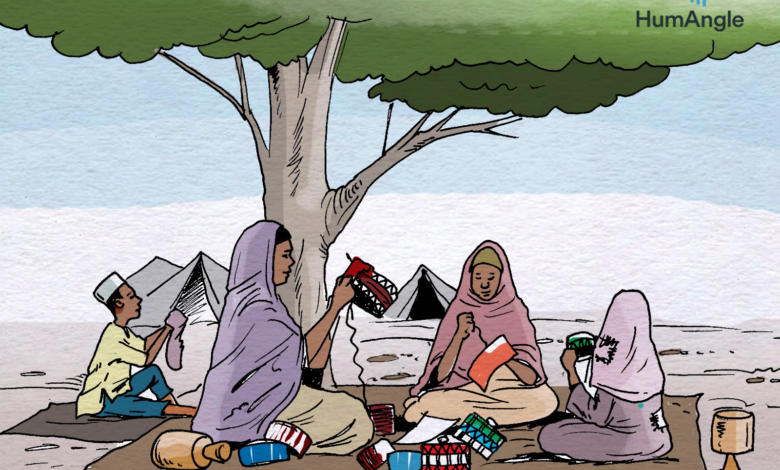Fewer Than One In Ten Displaced Women Have Access To Contraception -Survey
Where there is conflict, women and girls are constantly at risk of sexual and gender-based violence. However, their sexual and reproductive needs –which are essential to their survival– are not being considered, a survey reveals.

Fewer than one in ten sexually active women in a displacement camp in Maiduguri, northeast Nigeria, have access to contraceptives and use them, a survey has revealed.
Of 271 women surveyed who were sexually active, only 23, or just over 8 percent said they had access to contraceptives.
While 111 of those assessed stated they wanted more children, 67 of them noted they did not know where to get contraceptives or how to use them, the survey conducted by the International Centre For Research On Women (ICRW) shows.
HIV and Aids, and other sexually transmitted diseases are spreading among the displaced, organisations working with vulnerable women who have fled their homes say.
The organisation, in collaboration with Action Health Incorporated in Nigeria’s Lagos and the Uganda Red Cross Society in Kampala, assessed 480 displaced women in Muna El-Badawi displacement camp in Maiduguri, and 461 displaced women in Nakivale Refugee Settlement Camp in Isingiro, Uganda.
In a statement, the organisation says that there is always an increased risk of sexual and reproductive health concerns within camps and other places where displaced people live.
“Their vulnerabilities often include unsafe abortion, high maternal mortality, early and forced marriage, early and unintended childbearing, trafficking, intimate partner violence (IPV), and sexual exploitation, among others,” the report said.
Free sexual and reproductive health services remain crucial especially for women who are in economically disadvantaged positions. It can help reduce severe health risks women tend to be in while at camps.
Abortions
In July 2022, HumAngle reported how women in camps make pastes of pepper and detergent to abort unwanted pregnancies which led to them having abdominal pain while bleeding out.
Incidents of survival sex has also become a vicious trend amongst displaced persons in Borno camps where camp officials, who are incharge of sharing food rations, will oftentimes demand for sex before they give out relief materials.
The report states that sexual health services are oftentimes unavailable and, even when they are present, may have limitations in what they offer, a lack of quality of care or of an approach that recognises displaced women’s needs.
In the Muna El-Badawi camp, 480 women between the ages of 15 – 24 were assessed. The survey comprised women who are married, single, widows, and those who have been divorced.
Of the 271 who are sexually active, 165 said they have heard of contraceptives, meanwhile, the survey shows that only 23 were using them.
Asides those who did not care for contraceptives due to their choice of wanting more children, 67 women said they did not know where to find them and how to use them. Twenty-one said that their partner opposed the idea of family planning.
Other women gave reasons such as being concerned about their health after use (4 percent), while some stated that the cost was too high for them (6 percent). Beliefs that family planning was against their religion, not liking existing methods, and feeling embarrassed to ask for contraceptives were some of the reasons other women gave for their disuse.
Of the 23 displaced women who use contraceptive methods to protect themselves, only 11 are said to have gotten it within the camps. 173 of women assessed were not sexually active but only 21 said they knew where to get it.
Abuse cases
Women and girls in conflict settings are more susceptible to rape and other sexual exploitations that puts them at risk of sexually transmitted diseases, unwanted pregnancies, and psychological trauma amongst other outcomes.
In the ICRW survey, 50 displaced women admitted to being sexually abused in exchange for money and food while 293 assessed said they did not feel safe going to the toilet at night for fear of being targeted.
Last year, humanitarian stakeholders in Maiduguri –a town that has seen a surge of displaced persons from warring communities of Borno and other bordering states– said they received fresh reports of cases of sex and gender-based violence on a daily basis including from displacement camps.
Sexually transmitted diseases such as HIV/AIDS have also become rampant amongst women in these camps. According to a 2021 study, the breakdown in social structures, the increase in SGBV during conflict, and inadequate education and awareness increase the spread of the virus.
While these exist, displaced women who used sexual and reproductive health clinics and services were lesser than those who did not. Of the 170 women who used the services, 81 percent used it for pregnancy care and only 19 percent used it to manage a sexually transmitted disease.
Thirteen women said they used it for post-abortion care while only six used it for family planning services. One woman reportedly used it after a case of gender based violence.
Of the people who had not used the services, 31 percent said their families were against it and ten percent were ashamed of someone seeing them. Other reasons spanned from the cost of services, to the distance and attitude of service providers.
Support Our Journalism
There are millions of ordinary people affected by conflict in Africa whose stories are missing in the mainstream media. HumAngle is determined to tell those challenging and under-reported stories, hoping that the people impacted by these conflicts will find the safety and security they deserve.
To ensure that we continue to provide public service coverage, we have a small favour to ask you. We want you to be part of our journalistic endeavour by contributing a token to us.
Your donation will further promote a robust, free, and independent media.
Donate HereStay Closer To The Stories That Matter




